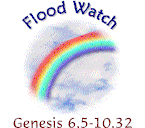 | 6.9 - "Noah walked with God"
- See 5.24. |
 | 6.15 - The dimensions of the ark are
roughly 450 x 75 x 45 feet. |
 | 7.6 and 8.13 - The flood lasts a little
more than a year. |
 | Compare Genesis 7.11 with 1.6-10. What
is the description of 7.11 suggesting? Note that the waters come from below and above. |
 | Compare 8.1 with 1.2. Now what is being
suggested? |
 | 8.4 - Ararat - We do not know which
specific mountain this might be. It does refer to some mountain or range in historic
Armenia. |
 | Compare 8.17 with 1.22. (Looking ahead
a bit, also compare 9.1 with 1.28.) How is the re-creation completed? |
 | Link 8:21 and 9:11; link 9:1 and 9:7. |
 | 8.21-22 - What are the three promises
God makes?
|
 | 9.2-4 - In contrast to 1.29-30, note
that animals are now available as food. |
 | 9.4 - On "blood," see
Deuteronomy 12.23. |
 | 9.5-6 - In contrast to God’s
dealing with Cain, a death penalty is now instituted. See Exodus 21.12-14, 28-32. Note
that even animals are subject to this law! |
 | Compare 9.16 and 6.12-13. What does God
see and do? |
 | 9.20-27 - This story accounts for the
later hostility between the Israelites and the Canaanites. In 9.22, to see the nakedness
of one’s father is later prohibited. (See Leviticus 18.7) |
 | 10.1-32 - The Table of Nations
descended from Noah |

![]()
 LESSON 5
LESSON 5![]()
![]()
![]()
![]()
![]()